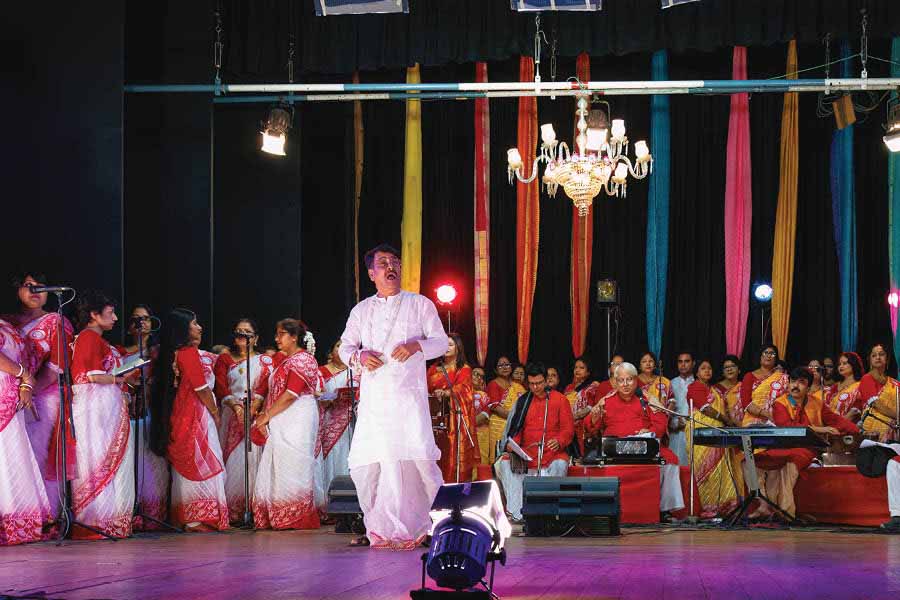A musical programme held at Gyan Manch recently lent insight into the forgotten legacy of Baiji Sangeet in Bengal.
The show that delved into the historical journey of the baijis was presented by the Academy Theatre and Riddhi Bandopadhyay Music Academy in association with My Kolkata. Devjit Bandopadhyay scripted the show and co-directed it with Riddhi Bandopadhyay. It featured actors Debjani Chatterjee, Debdut Ghosh and Avirup Sengupta, who contributed through dance, recitation and choreography, respectively.
History of Baiji Sangeet
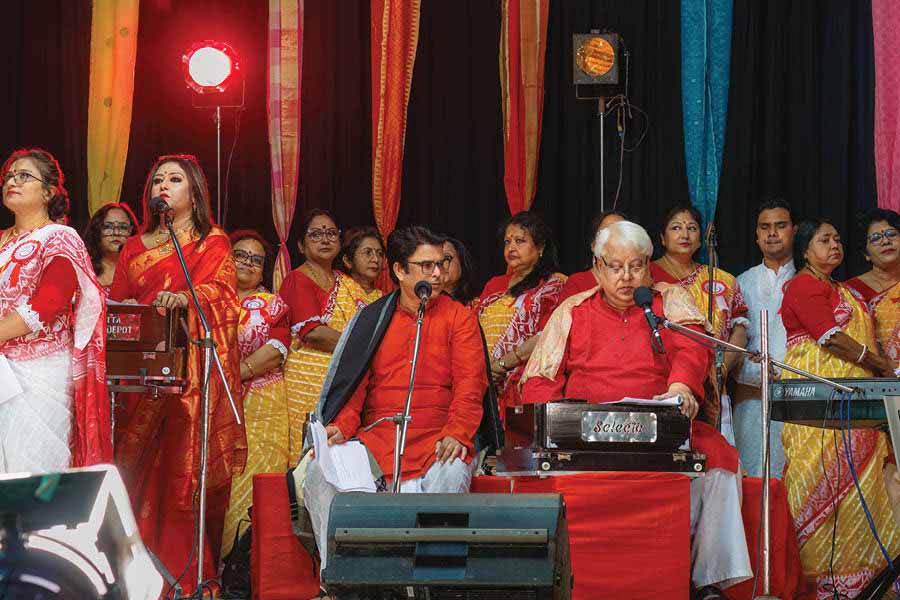
Riddhi Bandopadhyay, Debdut Ghosh and Devajit Bandopadhyay with the whole team performed songs of different times
Bengal has always been a cradle of musical heritage. It has a long tradition of Indian classical music. With the advent of Nawab Wajid Ali Shah in Kolkata in 1856, a new form of music, the genre of Lucknow or Awadh gharana started gaining popularity. Nawab Wajid Ali himself was a poet, playwright, dancer and a great patron of arts. Along with other things, he also brought with him many dancers and singers from Lucknow. A different style, genre of music started to emerge from Metiabruz. Bengal has a long tradition of Dhrupad. Khayal and Thumri started to become popular as well. There were many women performers who actually established this new genre of music with their mesmerising voices. The Lucknavi gharana that was established in the Metiabruz area slowly started getting popular among the Bengali bhadrolok. The elite-class society accepted Lucknavi gharana happily. Women performers slowly started to gain popularity and they were named baiji.
Though their contribution towards the emergence of semi-classical music is undeniable, baijis and their music have always remained shrouded in mystery and often been spoken of disgrace.
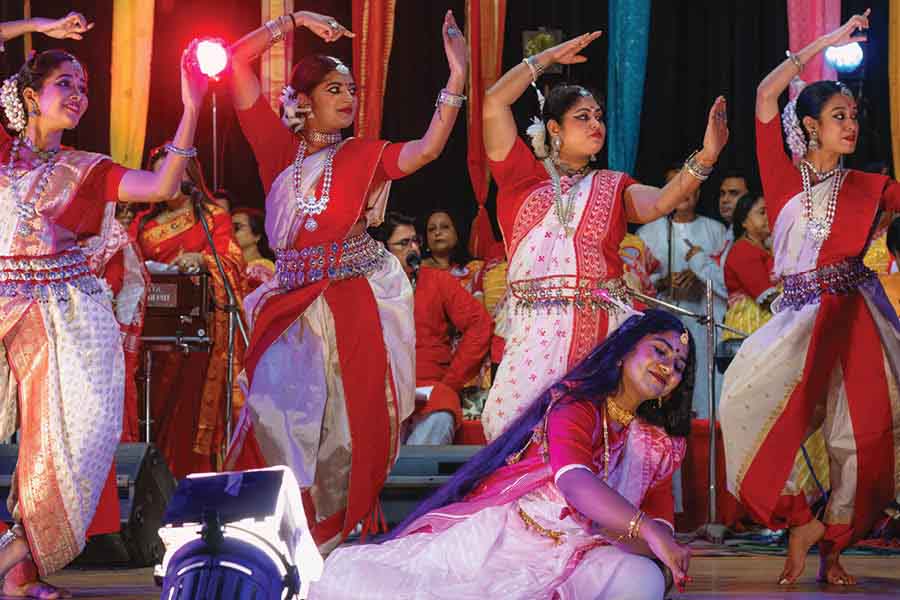
Some songs also had dance performances. The dance was choreographed by Abhirup Sengupta
The term baiji has its roots in Rajasthan or Madhya Pradesh. In Rajasthan, bai means mother and elder sister and ji is the suffix added to show respect. Bai also means women dancers and ji is for upper class. There were divisions too. While jaan meant both dancers and singers, bai was only for singers. There were many courtesans who became famous. The most famous non-Bengali of Armenian descent Gauhar Jaan (Angelina Yeoward) was the first performer to record music.
Gauhar Jaan was the daughter of Bari Malka Jaan who came to Calcutta and joined the courts of Nawab Wajid Ali Shah. Bengali courtesans like Harimoti, Krishna Bhamini, Indubala and many more also were renowned names of that time. Many of them like Nati Binodini transitioned to the theatre and later into the bioscope industry.
Exploration of Baiji legacy
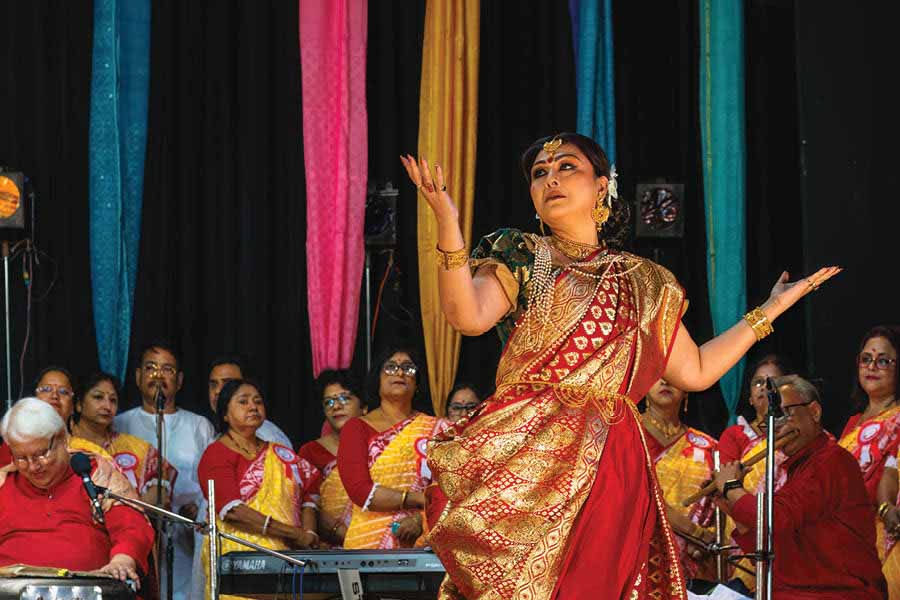
Debjani Chatterjee danced to two songs at the cultural show
The show was a captivating exploration of the Baiji legacy in Bengal. The programme dealt not only with the lives of baijis but also how it had a deep impact in the music of Bengal. Starting from theatre to bioscope, the music had an immense impact. Many baijis performed in plays.
One such performer was Kusum Kumari, famous for her dance, songs and acting. In a play named Alamgir directed by Sisir Bhaduri, she performed a dance with a group of other baijis at the end of the play.
The impact of Baiji Sangeet in the music of different composers like that of Atul Prasad Sen or even Tagore was also mentioned.
“We wanted to pay tribute to those gandharbis who are seldom spoken about. Though they have an immense contribution to music, yet they lie in disgrace. Not only that, we also wanted to show our roots, our heritage to the young generation and hence this production. We have tried to tell the story of these forbidden names, names that have gone into oblivion, their lives and about their contribution in music in a short span of time,” said Riddhi Bandopadhyay.
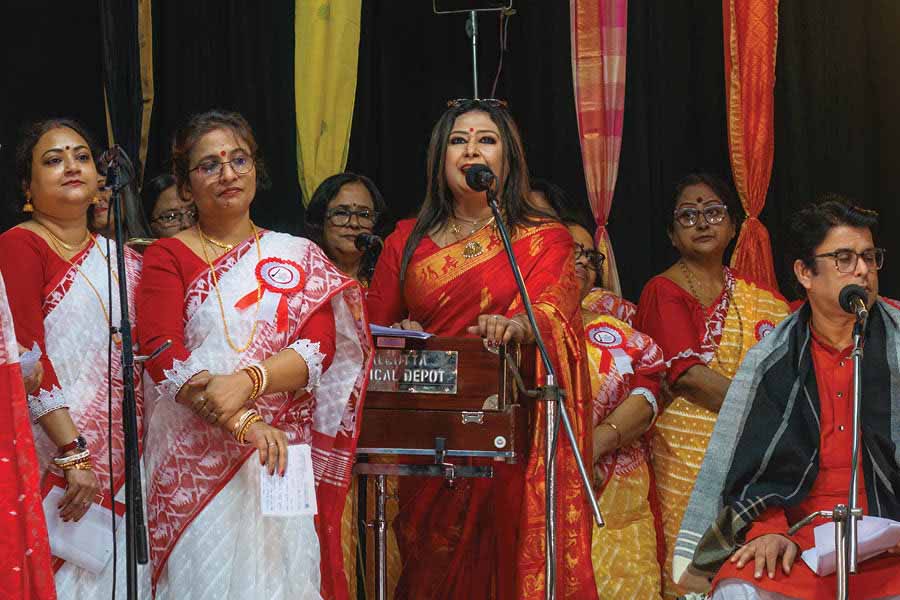
Riddhi Bandopadhyay performs
The show started with the song I am a very good Bengali babu. Songs like Ekhon ki ar nagor tomar amar proti temon achhe, Gangabaiji’s song Mone roilo soi moner bedona written by Ram Basu, Atul Prasad Sen’s song Jabo na jabo na jabo na ghore inspired by Bari Malka Jaan’s Mujhe behekao behekao na, Gauhar Jaan’s Phanki diye praner pakhi ure gelo aar elo na, Angoorbala Debi’s Esho sonar boron rani go and others were performed. Some songs were presented in chorus, while some were sung by Riddhi Bandopadhyay and Devjit Bandopadhyay.
Some songs also had dance performances. The dance was choreographed by Abhirup Sengupta. Debjani Chatterjee and Abhirup Sengupta’s team danced to some songs. Debdut Ghosh read out the script.
Speaking about the programme, Ghosh said: “We have a lot of things in our culture which have dhrupadi elements in them. The legacy of this parampara is transferred through generations by practice. Riddhi Bandopadhyay and Devajit Bandopadhyay have been performing songs in Bengali theatres for a long time. They have kept the works of legends alive. Devjit Bandopadhyay has worked extensively on the different facets of Bengali theatre songs. When such a person pens down a script, it’s going to be something that people will cherish. This programme is like a tribute to the past. Bengali music comprises different kinds of music. One such is Baiji Sangeet, which has an immense impact on Bengali music.
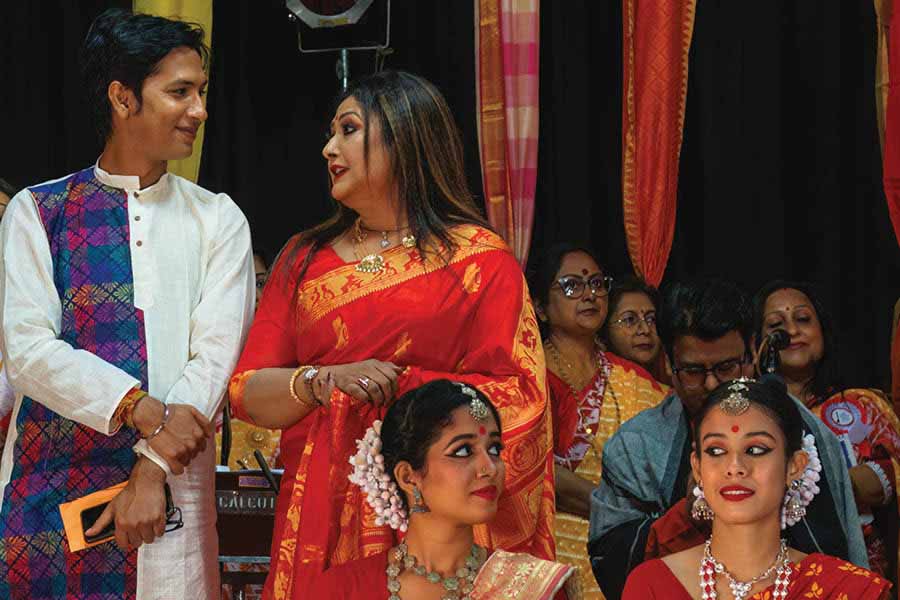
Choreographer of the show Abhirup Sengupta (left) with Riddhi Bandopadhyay on stage
Debjani Chatterjee danced to two songs. “The subject of the programme intrigued me. Except for some names, I was unaware about Baiji Sangeet and its history. Devjitda has penned a wonderful script. Devajitda along with Riddhi have presented before the audience the form of music which has almost gone into oblivion. I really appreciate their efforts and have tried to give my best.”
Abhirup Sengupta, the choreographer for the show, said he had tried to remain true to the tradition of Bengali dance forms. “The Bengali baiji performers did not perform in traditional styles only. Though there are elements of them, I have tried to keep the Bengali essence to it. In one of the songs, I used bits of Odissi dance since I am essentially an Odissi performer.”
Felicitation
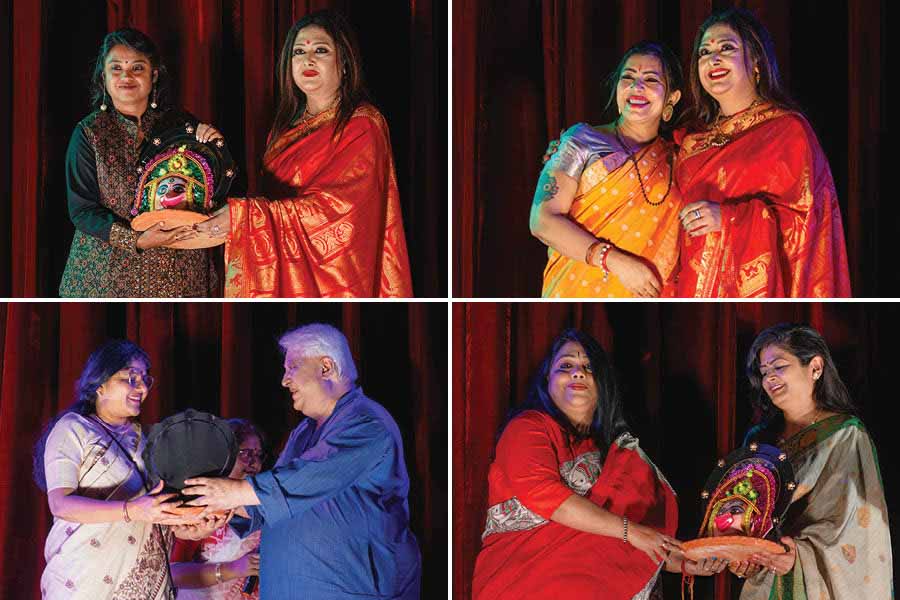
(Clockwise from top left) Riddhi Bandopadhyay felicitates Payel Sengupta and Sanchita Bhattacharya; Sumona Kanjilal receives a memento from Soma Das and Devjit Badopadhyay felicitates Swati Bhattacharya
Before the performances, there was a felicitation programme. Renowned writer and senior associate editor of Anandabazar Patrika Swati Bhattacharya was felicitated by Devjit Badopadhyay. Payel Sengupta, the editor of Sananda, was felicitated by Riddhi Bandopadhyay. Author Sumona Kanjilal was felicitated by Soma Das and Odissi danseuse Sanchita Bhattacharya was felicitated by Riddhi Bandopadhyay.
